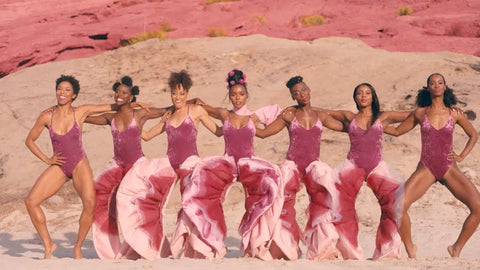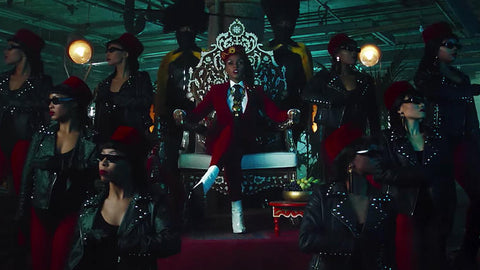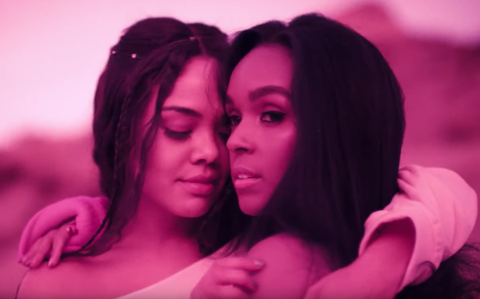Dirty Computer: Janelle Monáe's work of Joyful Defiance

On Friday Janelle Monáe released her much anticipated concept album, Dirty Computer, along with an accompanying 45 minute sci-fi “emotion picture” of the same name. I felt an instant connection with the album from the moment she presented us with the first two singles “Make Me Feel” and “Django Jane”, and salivated as she drip-fed us the juicy, poppy “Pynk” and smooth R&B vocals of “I Like That.” When I awoke Friday morning and realised the Emotion Picture was available on Youtube, I was ready to feast!
The film is as rich and vibrant visually as the album is sonically. While grappling with similar themes as The Handmaid’s tale, Dirty Computer stands out with a much more deliciously futuristic-kitsch universe closer in style to The Fifth Element, Total Recall, or Super Mario Brothers; and its Afro-futuristic, feminist take on the dystopian sci-fi genre is beautifully unapologetic. I’m not just talking about those striking grapefruit-coloured vulva pants either, which have become the most iconic look from the film.

In the film, we see Monae’s “Jane57821” captured by a governmental/religious organisation in a dystopian future who subdue non-conformers - in the film referred to as “dirty computers” - by digitally erasing their memories. As her memories are deleted one by one by 2 white men in white suits sipping coffee behind a computer console, a love story unfolds between her and a girl named Zen (played by her rumoured real-life girlfriend, Tessa Thompson) and a young man named Ché (played by Jayson Aaron). This serves as a framework for the album’s 4 stand-alone music videos.
Janelle is able to say so much about the way queer women of colour are viewed in our society just by being joyfully defiant with her aesthetic at every turn. We have seen it before with her other albums, but Dirty Computer has taken that life-affirming rebellion into the stratosphere. Scenes of Jane and her “highly melanated” friends cruising in a pink, floating convertible wearing all studded black leather, fishnets, and fingerless gloves; shots of underwear with slogans saying “Sex Cells,” and “I grab back”, with mountains of pubic hair bursting out from every corner; and the green and red power suits with her army of dancers in the “Django Jane” video. The number of times I found myself squealing with happiness at a visual moment during the film are too many to count.

This is coupled with equally subversive and massively quotable lyrics throughout. Again there were too many to count, but here are a few of my favourites:
“Remember when they told you I was too black for ya, and now my black poppin’ like a bra strap on ya!”
“Hundred men telling me to cover up my areolas while they block equal pay, sipping on they coca-cola.”
“And we gon’ start a motherfuckin’ pussy riot or we gon’ have to put ‘em on a pussy diet.”
When it comes to race there are many comparisons that can be drawn with Beyoncé’s Lemonade, but Dirty Computer is an absolute triumph of black queerness that celebrates the female body, friendships, and romance in a way that I have never seen in mainstream pop-culture, especially when it comes to its focus on bisexuality and non-monogamy. It fiercely kicks down the closet doors by offering positive representation where there wasn’t much before, and if there was, the representatives were almost 100% white. The album and film show us how far we’ve come in the past 25 years. I highly recommend watching Dirty Computer back-to-back with Can I Be Me?, a documentary about Whitney Houston’s life and career. Whitney Houston was forced into a box, her music and persona made to be more palatable to a white audience, and hounded by the media for her suspected romantic relationship with her best friend. I couldn’t help but wonder if Whitney were alive today, what she would have to say about Dirty Computer?

The other huge thing that jumped out at my whilst watching was how close to home it felt. While I’m sure it wasn’t Monae’s intention, the release of Dirty Computer feels especially timely here in Ireland four weeks out from the referendum on the 8th Amendment. The scenes where Jane is being told she is “dirty” and needs to be “cleaned” by the voice of a mother superior-type character is haunting to watch in a country that still feels the effects of the Magdalene laundries and mother & baby homes. Those painful ripples still reach across time, pulsating as we near a vote that may or may not give women in Ireland a right to bodily autonomy.
